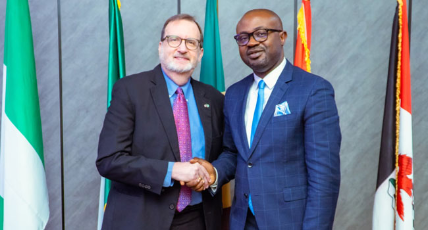AMID the recent policy change by the United States government reducing visa validity and entry allowances for Nigerians, the Minister of Interior, Olubunmi Tunji-Ojo, has met with the U.S. Ambassador to Nigeria, Richard Mills, in Abuja to discuss ways to address the concerns and strengthen bilateral cooperation on immigration matters.
The closed-door meeting, which took place on Wednesday, came just a day after the U.S. Embassy in Nigeria announced a major revision to its visa protocol, stating that most non-immigrant and non-diplomatic visas issued to Nigerians will now be valid for only three months and allow for single entry only.
This marks a significant departure from previous arrangements, which often permitted multiple entries over a longer duration, typically up to two years.
In a statement released via his official X (formerly Twitter) handle, Minister Tunji-Ojo noted that the federal government, under President Bola Ahmed Tinubu, was fully committed to addressing the concerns that triggered the U.S. decision—particularly issues related to visa overstays by Nigerian nationals.
“Our government, under the leadership of President Bola Tinubu (GCFR), will continue to ensure strict compliance across the board in key areas, including the issuance of secure travel documents with verified identities and implementing measures to limit overstays by travellers on U.S. visas,” the minister wrote.
Tunji-Ojo emphasized that the meeting was part of a broader effort to maintain and deepen diplomatic engagement between both countries, with a specific focus on ensuring that Nigeria’s immigration and travel policies reflect global best practices.
During the meeting, U.S. Ambassador Mills reportedly shared detailed insights into the rationale behind the revised visa policy.
He explained that the decision is part of a global reciprocity realignment initiative an effort by Washington to match visa terms and entry privileges with those offered by other nations, including Nigeria.
According to a statement from the U.S. Embassy, the changes are aimed at improving fairness in visa issuance worldwide and ensuring that visa arrangements are mutually equitable.
“The ambassador described the new e-visa policy of the Nigeria Immigration Service as an innovation intended to streamline and enhance the application process for foreign travellers into the country,” Tunji-Ojo said.
He added that the Nigerian delegation and the U.S. Mission agreed to enhance collaboration in several key areas:
- Visa regulation enforcement: Ensuring Nigerians comply with visa terms, particularly in terms of entry duration and permitted stay.
- Information sharing: Exchanging relevant data, including criminal or security-related records, to boost public safety.
- Public awareness: Promoting responsible travel practices among Nigerians, including compliance with international immigration norms.
Also present at the high-level engagement were the Permanent Secretary of the Ministry of Interior, Dr. Magdalene Ajani, and the newly appointed Comptroller General of the Nigeria Immigration Service (NIS), Kemi Nanna Nandap.
Both officials reaffirmed Nigeria’s readiness to uphold immigration responsibilities and welcomed U.S. support for capacity-building and information-sharing initiatives.
Analysts have observed that while the U.S. decision may appear abrupt, it reflects broader concerns about travel violations, including visa overstays by Nigerian nationals, a longstanding issue flagged in multiple international reports.
The Tinubu administration, which has pledged a renewed commitment to global standards, now appears keen to address these issues head-on.
As of now, Nigerians applying for U.S. non-immigrant visas including those for tourism, short business visits, or medical treatment will receive single-entry permits valid for just three months, mirroring the terms the Nigerian government offers U.S. citizens visiting Nigeria.
The shift, while creating new hurdles for frequent travellers, may signal a turning point in Nigeria’s immigration reform agenda and in its efforts to restore international confidence in the management of its citizens abroad.







